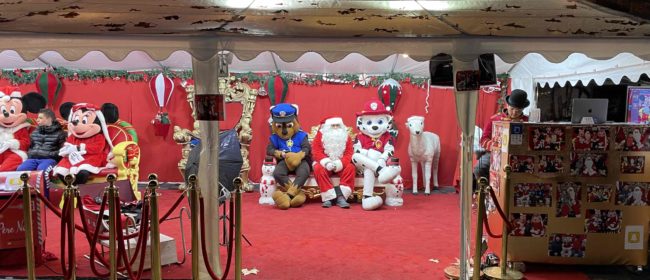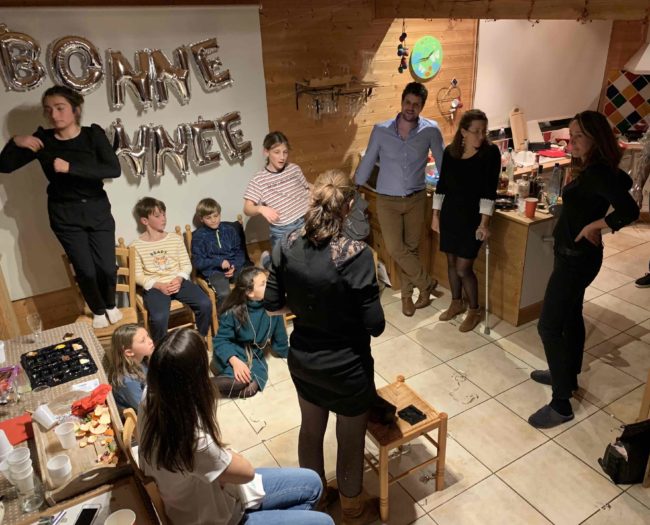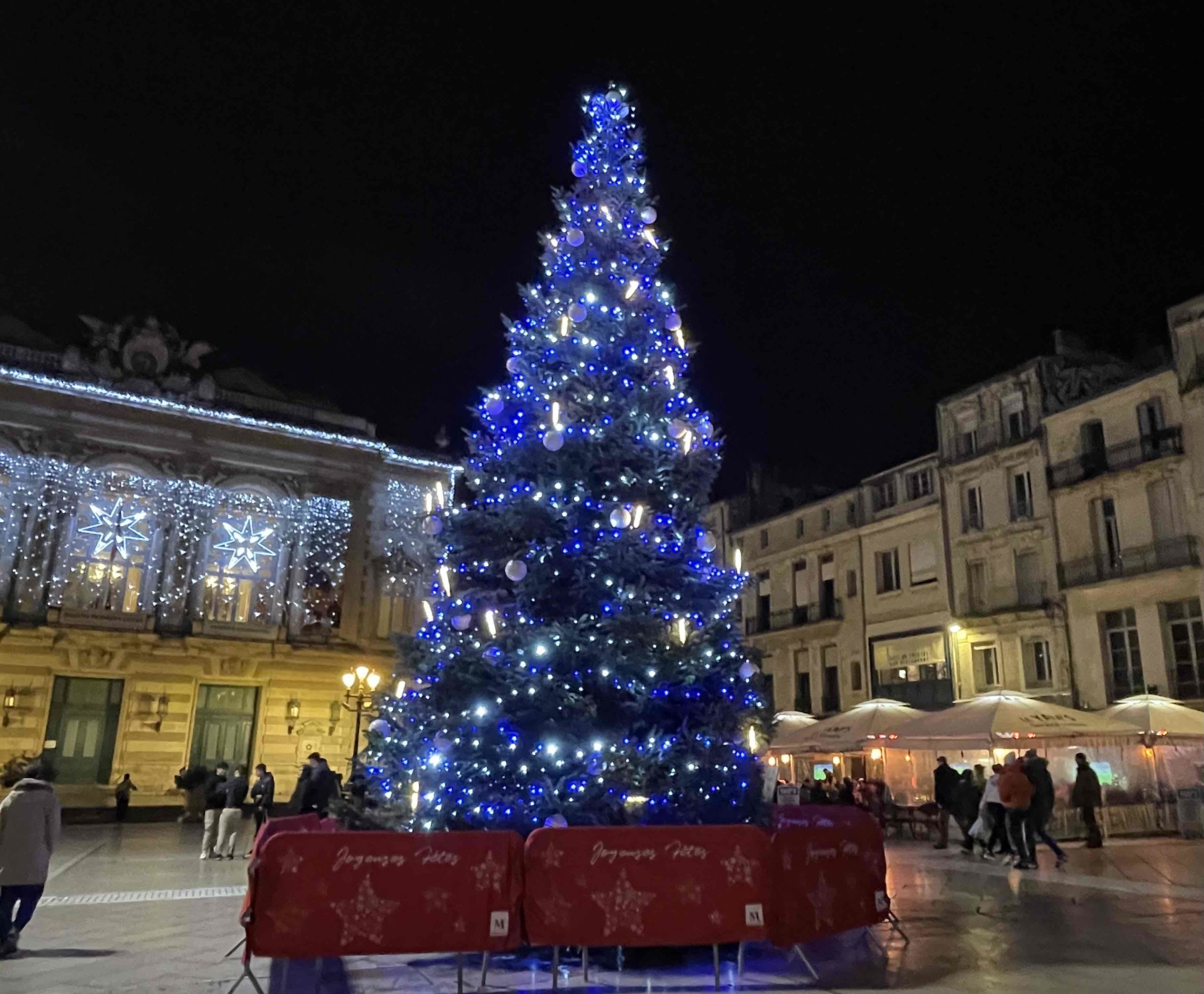With the holiday season upon us, you may be wondering how to say Happy Holidays in French to your Francophone friends and neighbors. Or maybe you’re traveling for the holidays to the sunny beaches in the south of France, Tahiti, or Madagascar – all French-speaking destinations.
Look no further! In this post, we’ll break down the most helpful French Christmas vocabulary to get you in the holiday spirit. So, how do you say Merry Christmas in French? Read on to find out!
This article is brought to you by LingoCulture, Where you can get unlimited private French classes via Zoom with native teachers for a flat monthly rate. It’s the closest thing to immersion you can get without living in a French-speaking country. Click here to learn more.
The holiday season
Let’s start off with the names of the season’s holidays in French, beginning with the name of the winter season itself!
L’hiver
Winter
Many big holidays (Christmas, Hanukkah, New Year’s, Epiphany…) happen during the winter, so the first word you’ll need to know is l’hiver, meaning winter in French. This season is masculine in French, which means that you’ll need to use the masculine form of adjectives when describing it.
- C’est un hiver froid ! – It’s a cold winter!
To learn the rest of the seasons, check out our other post covering all the seasons and the months in French.
Les fêtes de fin d’année
End-of-year holidays
To cover all of your winter holiday bases, you can refer to all winter holidays in French as les fêtes de fin d’année, which literally translates to end-of-year holidays. This broad category includes any and all winter holidays that occur in the French-speaking world, like Hanukkah, Christmas, New Year’s, and Three Kings’ Day.
L’avent
Advent
Advent, or the period leading up to Christmas, is a popular celebration and preparation time in French-speaking countries. Many cultures use advent calendars, or les calendriers de l’Avent, to count the days leading up to Christmas.
Le réveillon
Christmas Eve
Le Réveillon, also known as Christmas Eve, is a grand day of celebration in Francophone regions. One of the most popular Christmas traditions in France is a large meal eaten together as a family on le Réveillon, which usually includes some of the foods we’ll discuss later in this post!
- Que faites-vous pour le Réveillon ? / On mange de la dinde ! – What are you doing for Christmas Eve? / We’re eating turkey!
Noël
Christmas
Moving into the reason for the season, the way to say Christmas in French is Noël. It’s a French word that you’ve adopted into English, made popular by the traditional Christmas song “The First Noel.”
La Saint-Sylvestre
After the hustle and bustle of Christmas day, you’ll have a few days to relax before gearing up for the last fête of the year: New Year’s. The traditional expression for New Year’s Eve in French is la Saint-Sylvestre, so named for the saint who is celebrated on December 31st.
- À quelle heure commence ta fête de la Saint-Sylvestre ? – What time does your New Year’s Eve party start?
Le jour de l’an
New Year’s Day
Once you’ve counted from dix to un, it’s now le jour de l’an, or New Year’s Day! Much like other cultures, New Year’s resolutions are popular in Francophone countries, as well as the exchange of gifts and the sharing of a meal with loved ones.
La fête des rois
Three Kings’ Day, Epiphany
The final fête de fin d’année in our list is La fête des rois, or Three Kings’ Day. This French Christmas tradition, occurring on January 6th, marks the end of the French Christmas season, and originates in the story of the three kings arriving in Bethlehem with their gifts for Jesus. This day is also known as le Jour de l’Epiphanie, or Epiphany in English.
Traditionally, a special cake called “la galette des rois” is served on la Fête des rois, which contains “la fève,” a small item (traditionally a bean, but nowadays usually a small ceramic figurine) baked inside the cake. The person who gets the slice of cake containing la fève is then crowned king or queen of the day.
- J’ai reçu la fève ! Vive la reine ! – I got the bean! Long live the queen!
Traditional holiday items
Of course, this time of year is full of good food, good decorations, and lots of gifts! Here are some of the most common words for French holiday food and décor.
Foie gras
Foie gras, Goose liver pâté
Foie gras is a very common appetizer served all over France throughout the holiday season. This dish is made of goose liver and has a soft, spreadable consistency. While foie gras is usually served with bread or crackers, it’s best practice to place it on the bread or cracker instead of spreading it.
La dinde
Turkey
Another useful French Christmas term is the popular main dish: la dinde, meaning turkey. This turkey is stuffed with roasted chestnuts, called “marrons” and served alongside potato and vegetable dishes.
Fromage
Cheese
Ok so you probably know the French word for cheese already, but we figured we’d include it here anyway. Why? Because a cheese course is served at any big meal in France! Of course there will be plenty of fromage at every French holiday dinner.
La bûche de Noël
Perhaps the tastiest Christmas tradition in France is la bûche de Noël, or yule log. This log-shaped rolled cake is usually chocolate-flavored and is often actually decorated as a log, complete with candy mushrooms and small plants!
- Tu fais ta propre bûche de Noël, ou tu l’achètes ? – Are you making your own yule log cake, or are you buying it?

Le sapin de Noël
Christmas tree
One of the most-ubiquitous sights around the holidays is the Christmas tree, or un sapin de Noël. Much like other Western traditions, this French Christmas tradition consists of a spruce tree (un sapin) decorated with ornaments (des boules) and topped with an angel (un ange).
- Quel joli sapin de Noël ! J’adore les boules coloriées. – What a beautiful Christmas tree! I love the colorful ornaments.
Un cadeau
Gift, Present
Underneath your sapin de Noël, you may hope to find des cadeaux, or presents. Quite an important French Christmas vocabulary word! The Christmas tradition in France is to exchange most gifts on Christmas Eve rather than on Christmas Day.
- Quand échangez-vous des cadeaux ? – When do you exchange presents?
Holiday characters
Le Père Noël

Santa Claus
No French Christmas vocabulary list would be complete without learning how to say Santa Claus in French: he’s known as le Père Noël! Literally translated as Father Christmas, this jolly red-suited man looks much the same in French Christmas tradition as other Western cultures. The biggest exception is that le Père Noël visits France twice: once on Saint Nicolas’s Day on December 6th, then again on Christmas Day.
Le Père Fouettard
As a foil to le Père Noël, there is le Père Fouettard: a traditional incarnation of the “naughty list,” who punishes badly behaved children by giving them coal or beating them. This sidekick to Saint Nick exists in many different cultures, known under different names.
Le Grinch
The Grinch
This holiday character hates Christmas. While the frowning green man we think of as the Grinch has the same name in French as in English, French takes this word one step further and turns it into an adjective to describe anyone who acts grinchy: grincheux or grincheuse.
- Pouquoi t’es si grincheuse ? Allons au marché de Noël ! Ça va te faire du bien ! – Why are you so grinchy? Let’s go to the Christmas market! It’ll be good for you!

Religious vocabulary
Une crèche
Nativity scene
A popular Christmas decoration in Francophone countries is une crèche, or a nativity scene. This tableau is usually placed on a flat surface such as a tabletop or a shelf, and represents the birth of baby Jesus. Some crèches are incredibly detailed and complex, while others are simple and straightforward. However, most crèches include at least a donkey, an ox, three wise men, Mary and Joseph, and baby Jesus.
- J’ai vu une exposition de crèches qui étaient très élaborées. – I saw an exhibit of nativity scenes that were very elaborate.

Le bébé Jésus
Baby Jesus
No crèche would be complete without the main character: le bébé Jésus, or baby Jesus. This figurine is traditionally placed in a manger (un mangeoire), and surrounded by the Virgin Mary (la Sainte Vierge), Joseph, and the Three Wise Men (les Rois mages).
Useful holiday phrases
Joyeux Noël
Merry Christmas
You’ll often see and hear the phrase Joyeux Noël in France around the holidays – that’s because it means Merry Christmas in French! It’s sometimes accompanied by other well-wishes for the holiday season, and is always accompanied by a smile.
- Joyeux Noël, je t’aime ! – Merry Christmas, I love you!
Joyeux Hanouka
Happy Hanukkah
For friends and loved ones who celebrate Hanukkah, you can wish them happy holidays in French by saying Joyeux Hanouka ! Much the same as the phrase Joyeux Noël, this way of wishing others happy holidays in French is holiday-specific, so it’s best used with those you know are celebrating Hanukkah.
- Joyeux Hanouka, mon ami ! – Happy Hanukkah, my friend!
Joyeuses fêtes
Happy holidays
To wish others a general happy holidays in French, you can say Joyeuses fêtes ! While the word fête means party, this term references the whole period of les fêtes de fin d’année that we introduced above. It also uses the same adjective as the previous two phrases, but this expression uses the feminine plural adjective form joyeuses instead of “joyeux” to say happy.
- Merci d’être venus, joyeuses fêtes ! – Thank you for coming, happy holidays!
Bonne année
At the end of December, as you are attending your Saint-Sylvestre party dressed in your sparkliest outfit, you’ll want to shout Bonne année as the clock strikes midnight. This expression means Happy New Year in French, and is often followed by the year.
- Bonne année 2023 ! – Happy New Year 2023!

Summary: French Christmas vocab
Now that we’ve gone over all the different words you’ll need for talking about your happy holidays in French, we’ll leave you with a quick summary of your new French Christmas vocab:
| Holidays in French | English equivalent |
| L’hiver | Winter |
| Les fêtes de fin d’année | Winter holidays |
| L’avent | Advent |
| Le réveillon | Christmas Eve |
| Noël | Christmas Day |
| La Saint-Sylvestre | New Year’s Eve |
| Le jour de l’an | New Year’s Day |
| La fête des rois | Three Kings’ Day, Epiphany |
| Holiday foods in French | English equivalent |
| Foie gras | Foie gras, Goose liver pâté |
| La dinde | Turkey |
| Fromage | Cheese |
| La bûche de Noël | Yule log cake |
| Le sapin de Noël | Christmas tree |
| Un cadeau | Present, Gift |
| Holiday characters in French | English equivalent |
| Le père Noël | Santa Claus |
| Le père Fouettard | Santa Claus’s evil sidekick |
| Le Grinch | The Grinch |
| Religious vocabulary in French | English equivalent |
| Une crèche | Nativity scene |
| Le bébé Jésus | Baby Jesus |
| Useful holiday phrases in French | English equivalent |
| Joyeux Noël | Merry Christmas |
| Joyeux Hannouka | Happy Hanukkah |
| Joyeuses fêtes | Happy holidays |
| Bonne année | Happy New Year |
Conclusion
In this post, we’ve covered the necessary French Christmas terms to have a jam-packed holiday season! From wishing others Joyeux Noël to eating la dinde and la bûche de Noël, you’re ready for some happy holidays in French. Don’t forget to put out your crèche, put up your sapin de Noël, and watch out for le père Fouettard.
Joyeuses fêtes to you and your loved ones!
